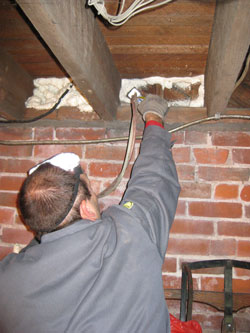In Business Since | License #
In Business Since | License #


Spray foam is fast & effective. Hundreds of tiny gaps and cracks in the area of the basement rim joist allow outside air into the basement. Spray foam’s ability to expand, fill gaps and insulate make it an excellent treatment for basement air sealing.
It's not difficult to determine whether or not you should air seal your basement. If a floor directly above the basement is uncomfortably chilly during the winter, chances are good that basement air leaks are responsible. Of course, the basement itself is sure to be even colder if frigid air is leaking in through gaps, cracks and holes around the perimeter of the foundation.
If you're experiencing discomfort in your home, have a Dr. Energy Saver dealer check out your basement for air sealing needs. Our experienced technicians can make recommendations to give you a more comfortable home! Call or click below to get in touch with your local contractor.
Many houses have basement insulation in the form of fiberglass batts that are installed between basement ceiling joists. Fiberglass insulation won't stop air leaks and the effective R-value of fiberglass insulation drops significantly when air can move through the material. If you have fiberglass insulation in the basement, consider replacing it with rigid foam insulation installed against basement walls. This insulation upgrade will make the basement itself more comfortable, while also improving overall home comfort and energy efficiency. Other benefits: Rigid foam insulation won't compress, fall out of place, absorb moisture or support mold like fiberglass insulation tends to do.
The perimeter of the basement is where most basement air leaks can be found. Take a close look at how your basement is framed. A wood "mudsill" rests flat on top of the foundation, and a vertical rim joist (aka band joist) rests on the mudsill. Small gaps between the mudsill and the foundation provide air leak pathways. So do cracks in the rim joist and holes drilled in the rim joist for water lines, electrical wires, plumbing vents, fuel lines and dryer or stove vents. When you air seal the basement, all of these air leaks are sealed using spray foam or sealant.
Air can also leak into the basement around basement windows. Many homeowners choose to replace old, single-pane basement windows with vinyl basement windows made with insulated glass. This upgrade improves energy efficiency by reducing air leakage around the window and by reducing conductive heat transfer through the glass. Vinyl basement windows won't rust (like steel-framed windows) or rot (like wood windows), and they never need painting or other maintenance.
What if you have a walkout basement or a basement with a Bilco-type door that opens to the outside? In both cases it's very important to install effective weatherstripping around these exterior doors to reduce air infiltration.
Every part of your basement has the potential to cause air leaks in your home. Dr. Energy Saver can prevent energy loss by inspecting your basement for leaks and suggesting the needed solutions. Contact your locally certified contractor today!
Looking for a price? Get a no cost, no obligation free estimate.